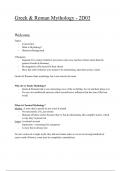Class notes
GKROMST 2D03 Complete Class Notes
- Course
- GKROMST 2D03 (GKROMST2D03)
- Institution
- McMaster University (mcmasteru)
All notes from the in class slides along with all teacher comments. Really an interesting class and my professor Matthew Chandler was amazing, his notes and stories made the class what it is.
[Show more]




